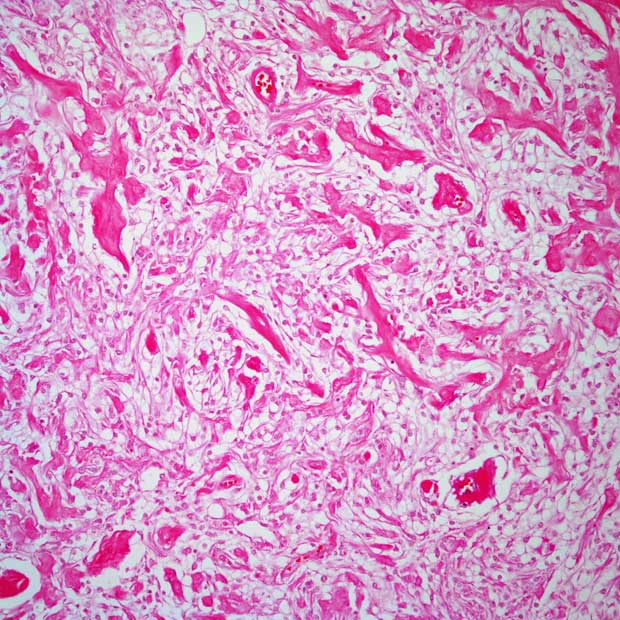Olaptesed Pegol Combo Yields ‘Meaningful’ 15-Month Survival in Glioblastoma
Overall survival is expected to continue improving among patients with glioblastoma being treated with frontline olaptesed pegol plus radiotherapy and bevacizumab who remain on the phase 1/2 GLORA study.
Investigators of the dose-escalation phase 1/2 GLORIA study are assessing the efficacy and safety of olaptesed pegol with an estimated enrollment of 27 patients with partially resected or unresected glioblastoma.

Frontline treatment with olaptesed pegol (NOX-12), radiotherapy, and bevacizumab (Avastin) elicited sustained responses among patients with glioblastoma, according to a press release on findings from a 14-month survival update from the phase 1/2 GLORIA study (NCT04121455).1
Overall, 83% (n = 5/6) of patients receiving the regimen in the GLORIA expansion arm were still alive after a median of 15 months. Investigators anticipate that the overall survival (OS) will continue to increase over time among patients who remain on treatment.
“Reaching the 15-month survival point with this expansion arm is a significant milestone in our development of [olaptesed pegol] in glioblastoma, and to do so with more than 80% of patients still on study represents a fantastic achievement,” Aram Mangasarian, chief executive officer at TME Pharma, said in the press release. “This latest set of survival data further underlines the clinically meaningful improvement that this treatment combination of [olaptesed pegol], radiotherapy and bevacizumab could bring over the current standard of care for this challenging indication with extremely poor prognosis.”
Investigators of the dose-escalation phase 1/2 GLORIA study are assessing the efficacy and safety of olaptesed pegol with an estimated enrollment of 27 patients with partially resected or unresected glioblastoma. The study includes several experimental cohorts consisting of different regimens and included 200 mg of olaptesed pegol and radiotherapy; 400 mg of olaptesed pegol and radiotherapy; 600 mg of olaptesed pegol and radiotherapy; 600 mg of olaptesed pegol, radiotherapy, and 10 mg/kg of bevacizumab.
Moreover, there are several expansion regimens, including 600 mg of olaptesed pegol plus radiotherapy and 10 mg/kg of bevacizumab; 600 mg of olaptesed pegol and radiotherapy; and 600 mg of olaptesed pegol, radiotherapy, and 200 mg of pembrolizumab.
The primary end point of the trial is treatment-related adverse effects. Secondary end points include progression-free survival (PFS) at 6 months, median PFS, median OS, tumor vascularization, and quality of life.
Patients 18 years and older with newly diagnosed, histologically confirmed supratentorial World Health Organization grade 4 glioblastoma and unmethylated MGMT status were able to enroll on the trial. Additional eligibility criteria included having an ECOG performance status of 0 to 2, a stable or decreasing dose of corticosteroids during the week prior to study entry, and an estimated life expectancy of at least 3 months.
A Data Safety Monitoring Board previously assessed safety data from the first enrolled patient receiving 4 weeks of treatment in the GLORIA trial in January 2022.2 The board determined that treatment with olaptesed pegol plus bevacizumab and radiotherapy was safe, permitting investigators to enroll additional patients onto the expansion arm.
“The combination with the anti-PD-1 inhibitor pembrolizumab is of particular interest as we expect this combination therapy to unlock a stronger and more durable immune response against the tumor. This is based on our previous observation that [olaptesed pegol] drives infiltration of activated cytotoxic immune cells into brain tumor tissue,” Mangasarian said in a press release at the time of the safety data assessment.
References
- TME Pharma announces positive 15-month survival data from GLORIA expansion arm evaluating NOX-A12 in combination with radiotherapy and bevacizumab in glioblastoma. News release. TME Pharma N.V. June 28, 2023. Accessed July 6, 2023. https://shorturl.at/aGKM3
- NOXXON provides progress update on the expansion arms of the phase 1/2 GLORIA trial with NOX-A12 in brain cancer patients. News release. NOXXON Pharma N.V. January 7, 2022. Accessed July 6, 2023. https://shorturl.at/opwOZ